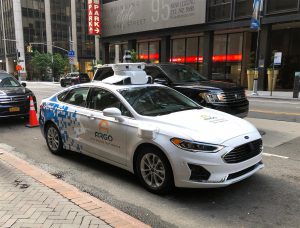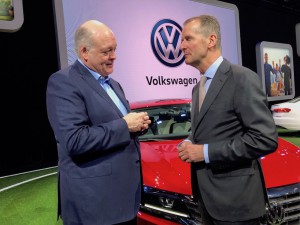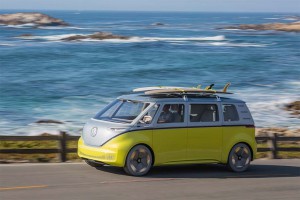
A Ford fusion sedan, modified by Argo AI to operate autonomously, is shown in Manhattan on Friday morning,
Ford and VW today formally unveiled an expanded “collaboration” they hope will position them as leaders in autonomous and electric vehicle development, even while helping slash the massive expenses required to bring those technologies to market.
The announcement comes barely six months after the two industry giants formed a joint venture focused on the development of commercial vehicles, the first pf which is expected to bring its first products to “select global markets starting in 2023.” Together, Ford and VW hope to leverage the economies of scale that can come from their combined global production of around 18 million vehicles annually.
“Unlocking the synergies across a range of areas allows us to showcase the power of our global alliance in this era of smart vehicles for a smart world,” Ford CEO Jim Hackett said ahead of a joint news conference in New York City on Friday morning. But, Hackett also stressed there will be no cross-holdings or any other effort to financial link their companies, Ford and VW expecting to remain “independent and fiercely competitive in the marketplace.”
Separately, in an exclusive conversation with TheDetroitBureau.com, Hackett said “We have left the door open to further cooperation,” though he cautioned, “We haven’t kicked any off yet.”
Even while announcing their first joint venture back in January, Ford and VW officials made it clear that they expected to expand the collaboration, if possible, to include both autonomous and electrified vehicles. But locking things down has taken longer than many observers had expected. There were a number of speed bumps along the way. For one thing, Ford President Jim Farley told TheDetroitBureau.com earlier this year, some of their individual efforts were out of sync from a timeline perspective, especially their electrification programs.
(End of the line as the last VW Beetle rolls off the assembly line. Click Here for the story.)
Both manufacturers are racing to bring new, long-range battery-electric vehicles, or BEVs to market. VW’has committed about $10 billion to the project in the near-term, hopes to have about 50 all-electric models in production by mid-decade and recently launched the first long-range model, the Audi e-tron, while new Porsche and VW brand models will reach showrooms over the coming 12 months. VW CEO Herbert Diess is so upbeat about their prospects he recently upped the company’s global BEV sales forecast from 15 million to 22 million over the coming decade.

Ford CEO Jim Hackett, left, and VW CEO Herbert Diess met at the Detroit Auto Show in January to discuss their first collaboration,
Ford will reveal its first long-range electric-car later this year, a performance-oriented SUV “inspired” by its Mustang coupe. The automaker has committed about $11 billion to electrification, though that will include other battery-based technologies, including plug-in hybrids.
As part of the new deal, VW will give Ford access to the modular MEB “architecture” it has developed, and which will be used for the majority of its upcoming BEVs, including the VW ID3 and an all-electric remake of its classic Microbus called the ID Buzz.
Ford will use the MEB platform for “at least one high-volume fully electric vehicle in Europe by 2023,” the joint statement noted, based on the modular MEB platform VW developed to underpin the majority of its future battery-cars.
However, that is likely “just the beginning,” said Sam Abuelsamid, a principle analyst with Navigant Research. He expects the platform eventually will be used for still more Ford products to gain even further economies of scale.
As significant as the tie-up on battery-car development might be, a senior Ford official told TheDetroitBureau.com this week that “the big deal” that the Detroit and German automakers have been working on is their new collaboration on autonomous vehicles.
Both have been actively working to develop self-driving vehicles, though the costs associated with the technology are huge. A study released last month by AlixPartners forecast industry-wide spending on autonomous vehicles will reach an annual $85 billion by the middle of the coming decade.
For its part, Ford has made a series of aggressive moves to take a leadership position, including the $1 billion it said it would invest in the Pittsburgh-based start-up Argo AI in 2017. There are a variety of different levels of self-driving vehicles, some requiring a motorist to remain behind the steering wheel in the event of an emergency, Argo is focusing on what is known as “Level 4” autonomy, vehicles capable of operating without a driver, albeit in “geo-fenced” areas with well-marked roads and in reasonably good weather conditions.
Argo already has test fleets operating in five U.S. cities, including Pittsburgh, Palo Alto, Detroit, Miami and Washington, D.C.
For its part, Volkswagen had launched an in-house program called Autonomous Intelligent Driving, or AID which currently has 200 employees. It recently ended its relationship with Aurora, another autonomous vehicle start-up and will now team-up with Argo.
As part of their new deal, VW is committing $2.6 billion, including $1 billion in funding for Argo, while rolling AID into the Pittsburgh company. And it will purchase another $500 million of Ford’s shares in Argo over the next three years.
Argo, for its part, will set up a new base in Europe and will begin testing its technology there using Volkswagen products. All three companies stressed that Argo will continue to operate as an independent company despite the deep investments by Ford and, now, VW.
As a result of the new collaboration, said Bryan Salesky, co-founder and CEO of Argo AI. The company’s “technology could one day reach nearly every market in North America and Europe, applied across multiple brands and to a multitude of vehicle architectures.”
When word began to leak out about the talks between Ford and Volkswagen there was speculation about just how far the two companies might go. They now emphasize there are no plans to merger, nor to even aim for a more limited alliance, such as the one between Renault, Nissan and Mitsubishi. But questions remain about whether Ford and VW might yet look for other options, such as ways to share purchasing, or even distribution in markets where one company is weak, the other strong.
The two industry giants have had a long relationship going back to the 1980s when they combined their South American operations into what was called AutoLatina. But the venture had an acrimonious break-up a decade later,
(BMW, Daimler announce their own autonomous vehicle collaboration. Click Here for more.)
Alliances, in all their forms, have become a major part of today’s automotive world, often pairing traditionally fierce competitors. Honda and General Motors have teamed up on both autonomous vehicles and fuel-cell technology. BMW recently announced a joint venture with Jaguar Land Rover aimed at developing battery-car technology.
But such deals are rarely monogamous. BMW also announced this month a partnership with erstwhile rival Daimler AG targeting autonomous vehicle technology.
Ford, for its part, will continue to work with other electric vehicle partners, including Zotye in China and, in the U.S., with Rivian, a suburban Detroit start-up that hopes to bring both an all-electric SUV and pickup to market next year.


